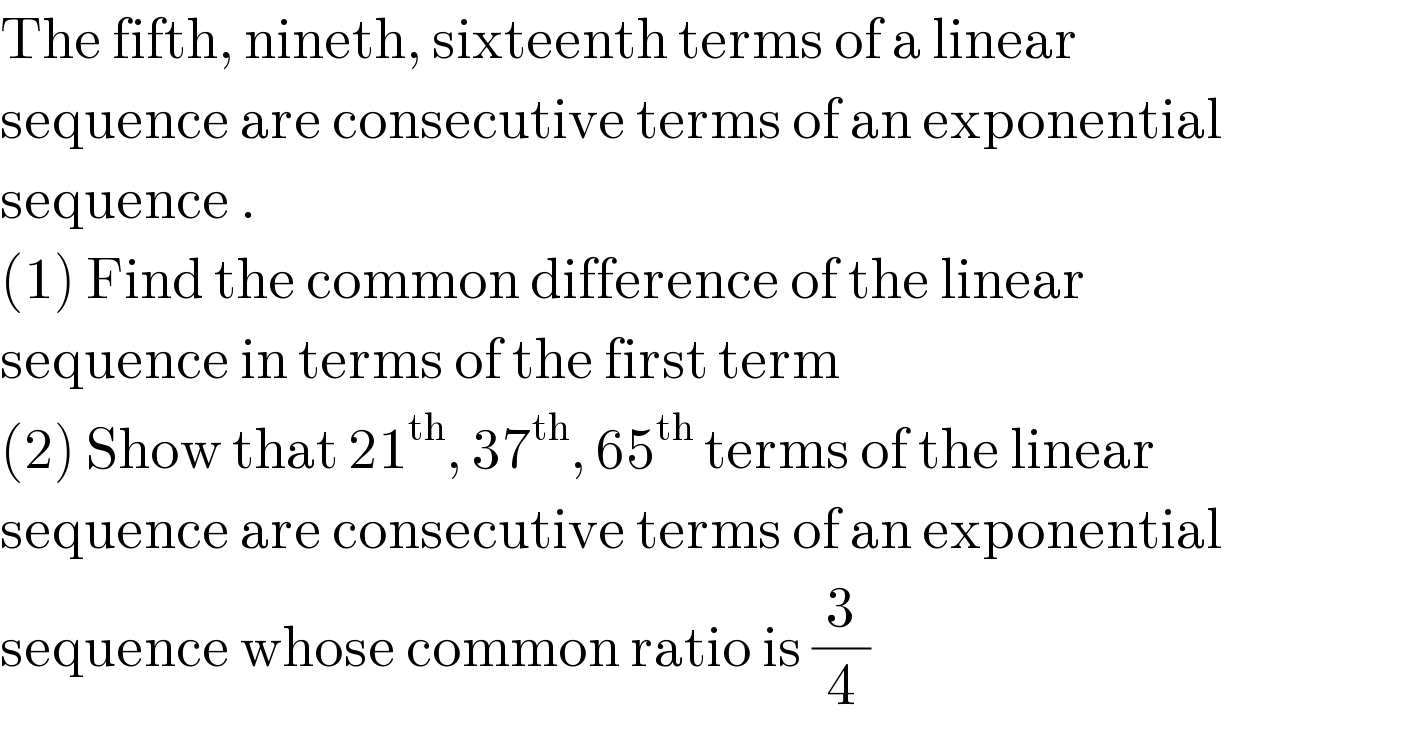Question Number 10489 by Saham last updated on 13/Feb/17

$$\mathrm{The}\:\mathrm{fifth},\:\mathrm{nineth},\:\mathrm{sixteenth}\:\mathrm{terms}\:\mathrm{of}\:\mathrm{a}\:\mathrm{linear}\: \\ $$$$\mathrm{sequence}\:\mathrm{are}\:\mathrm{consecutive}\:\mathrm{terms}\:\mathrm{of}\:\mathrm{an}\:\mathrm{exponential} \\ $$$$\mathrm{sequence}\:. \\ $$$$\left(\mathrm{1}\right)\:\mathrm{Find}\:\mathrm{the}\:\mathrm{common}\:\mathrm{difference}\:\mathrm{of}\:\mathrm{the}\:\mathrm{linear}\: \\ $$$$\mathrm{sequence}\:\mathrm{in}\:\mathrm{terms}\:\mathrm{of}\:\mathrm{the}\:\mathrm{first}\:\mathrm{term} \\ $$$$\left(\mathrm{2}\right)\:\mathrm{Show}\:\mathrm{that}\:\mathrm{21}^{\mathrm{th}} ,\:\mathrm{37}^{\mathrm{th}} ,\:\mathrm{65}^{\mathrm{th}} \:\mathrm{terms}\:\mathrm{of}\:\mathrm{the}\:\mathrm{linear} \\ $$$$\mathrm{sequence}\:\mathrm{are}\:\mathrm{consecutive}\:\mathrm{terms}\:\mathrm{of}\:\mathrm{an}\:\mathrm{exponential} \\ $$$$\mathrm{sequence}\:\mathrm{whose}\:\mathrm{common}\:\mathrm{ratio}\:\mathrm{is}\:\frac{\mathrm{3}}{\mathrm{4}} \\ $$
Answered by mrW1 last updated on 14/Feb/17

$$\left(\mathrm{1}\right) \\ $$$${a}_{\mathrm{5}} ={a}+\mathrm{4}{d} \\ $$$${a}_{\mathrm{9}} ={a}+\mathrm{8}{d} \\ $$$${a}_{\mathrm{16}} ={a}+\mathrm{15}{d} \\ $$$$\frac{{a}+\mathrm{15}{d}}{{a}+\mathrm{8}{d}}=\frac{{a}+\mathrm{8}{d}}{{a}+\mathrm{4}{d}} \\ $$$${let}\:{x}=\frac{{d}}{{a}} \\ $$$$\frac{\mathrm{1}+\mathrm{15}{x}}{\mathrm{1}+\mathrm{8}{x}}=\frac{\mathrm{1}+\mathrm{8}{x}}{\mathrm{1}+\mathrm{4}{x}} \\ $$$$\mathrm{1}+\mathrm{19}{x}+\mathrm{60}{x}^{\mathrm{2}} =\mathrm{1}+\mathrm{16}{x}+\mathrm{64}{x}^{\mathrm{2}} \\ $$$$\mathrm{4}{x}^{\mathrm{2}} −\mathrm{3}{x}=\mathrm{0} \\ $$$$\mathrm{4}{x}\left({x}−\frac{\mathrm{3}}{\mathrm{4}}\right)=\mathrm{0} \\ $$$${x}=\mathrm{0}\:{or} \\ $$$${x}=\frac{\mathrm{3}}{\mathrm{4}} \\ $$$${x}=\frac{{d}}{{a}}=\frac{\mathrm{3}}{\mathrm{4}} \\ $$$${d}=\frac{\mathrm{3}}{\mathrm{4}}{a} \\ $$$$\left(\mathrm{2}\right) \\ $$$${a}_{\mathrm{21}} ={a}+\mathrm{20}{d}={a}+\mathrm{20}×\frac{\mathrm{3}}{\mathrm{4}}{a}=\mathrm{16}{a} \\ $$$${a}_{\mathrm{37}} ={a}+\mathrm{36}{d}={a}+\mathrm{36}×\frac{\mathrm{3}}{\mathrm{4}}{a}=\mathrm{28}{a} \\ $$$${a}_{\mathrm{65}} ={a}+\mathrm{64}{d}={a}+\mathrm{64}×\frac{\mathrm{3}}{\mathrm{4}}{a}=\mathrm{49}{a} \\ $$$$\frac{{a}_{\mathrm{65}} }{{a}_{\mathrm{37}} }=\frac{\mathrm{49}{a}}{\mathrm{28}{a}}=\frac{\mathrm{7}}{\mathrm{4}} \\ $$$$\frac{{a}_{\mathrm{37}} }{{a}_{\mathrm{21}} }=\frac{\mathrm{28}{a}}{\mathrm{16}{a}}=\frac{\mathrm{7}}{\mathrm{4}}=\frac{{a}_{\mathrm{65}} }{{a}_{\mathrm{37}} } \\ $$
Commented by Saham last updated on 14/Feb/17

$$\mathrm{God}\:\mathrm{bless}\:\mathrm{you}\:\mathrm{sir}. \\ $$
